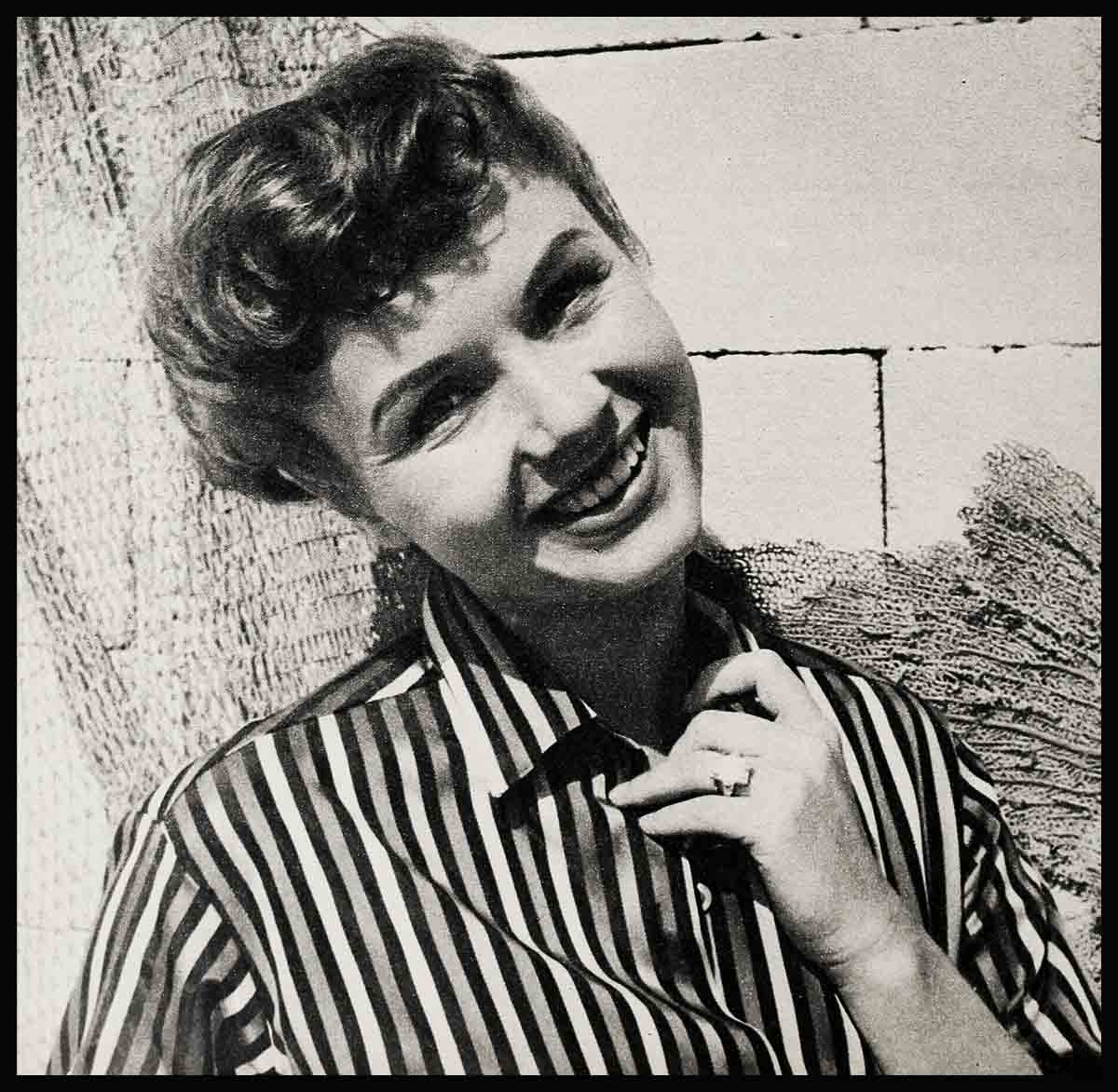
It’ll Be An Old-Fashioned Wedding—Debbie Reynolds
Proudly, Mary Frances Reynolds held out her small, slender left hand. The light reflected brilliantly from the large, emerald-cut diamond. Her audience was more than appreciative—they were overwhelmed. “How dreamy!” “It’s gorgeous!” “What a rock!”
Debbie beamed at them. A few years ago she had been a girl like these. Now she was the object of their admiration. Or at least, the ring was. All afternoon at Glendale High, where she was visiting her friend, Jeanette Johnson, and Jeanette’s pupils, the girls’ eyes had been straying to the diamond. They glanced at it even while they questioned Debbie about Eddie and her wedding plans. They clustered around her on the school playground (Jeanette had achieved what used to be Debbie’s ambition: to be a gym teacher) and stared at that left hand, until finally Jeanette interrupted the questioning and said, “You may each take a quick look at Debbie’s ring.” Then they were satisfied.
At first, they had been a little shy. When Jeanette had arrived on the playground with the star beside her and called, “Girls! I’d like you to meet my best friend, Debbie Reynolds,” they had dropped their chatter and subsided into an awed silence from which finally emerged a collective and worshipful, “Hello.”
“Hi, gang,” Debbie had said, airily.
In pink corduroy pants and flat-heeled shoes, she was as short and as young looking as most of the high school students. Except for her poise and professional demeanor, Debbie might easily have passed for one of them.
“Last fall,” Jeanette began, “Debbie promised to visit my classes some day when she wasn’t too busy. She’s not making a movie until September, so here she is. She has been kind enough to agree to talk to us informally. You’ve got fifteen minutes.”
Squeals of delight interrupted the introduction. “After that,” continued Miss Johnson, “I want you to divide into teams. I want you to show Debbie what sort of volley ball we play these days. Then she can see what kind of teacher I am.”
The Glendale girls were thrilled, but for a second no one said anything. Then one asked the first question.
“Di-did you always want to be in movies?” she stammered.
Debbie smiled. “No,” she answered. “I wanted to be a gym teacher, too. But when I was sixteen I won an amateur talent contest in Burbank. The prize was a contract at Warner Brothers. From then on I was in show business for keeps.”
“Is it really as wonderful as they say?” another sophomore asked.
“It certainly is,” Debbie assured her. “But it’s hard work. Harder than school and the hours are twice as long.”
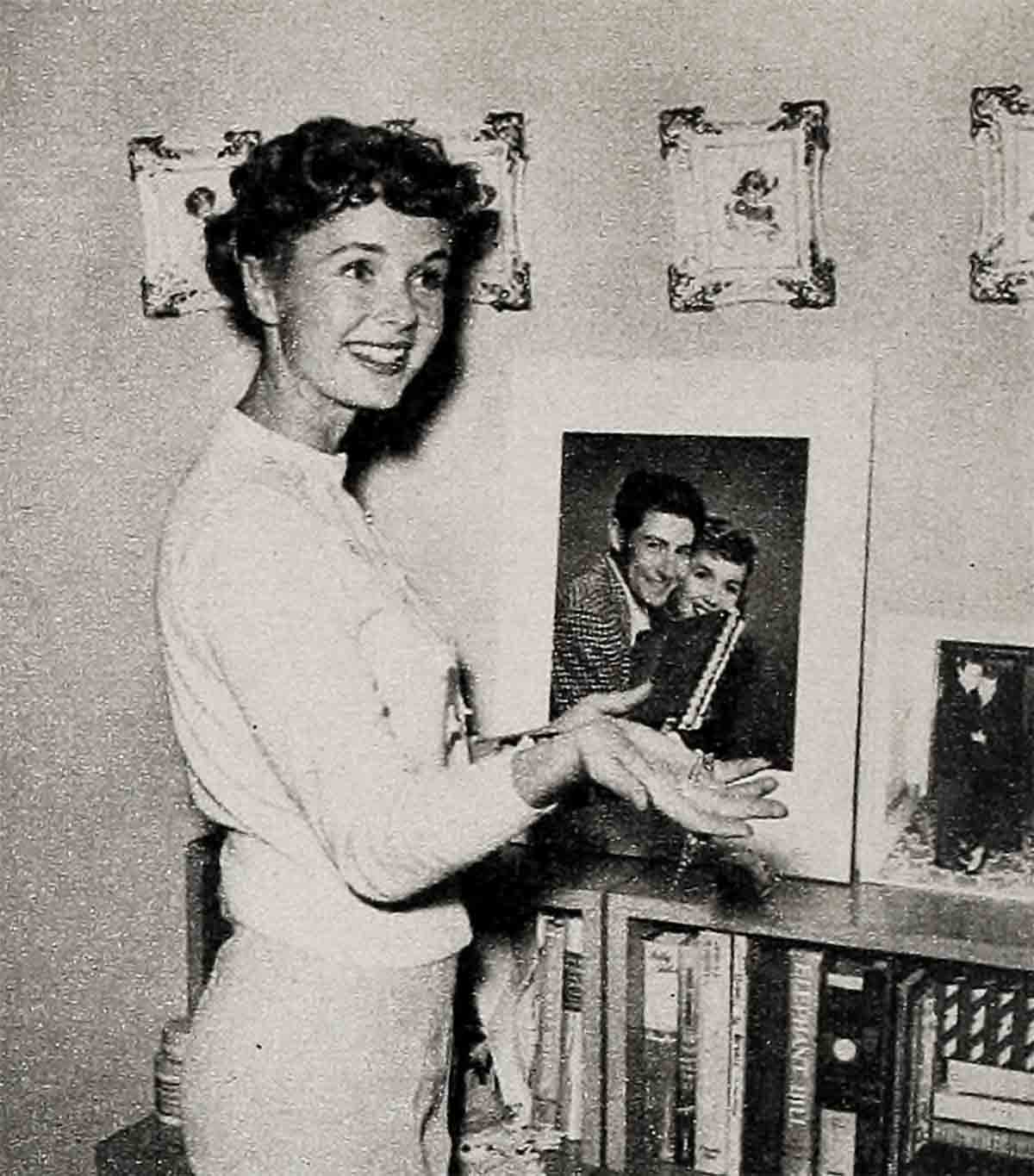
“When do you and Eddie plan to get married?” someone asked.
“During the last of June,” Debbie said readily. “Probably the thirtieth.” Her friendly, relaxed manner put the girls so completely at ease that their questions now came rapidly. “How about the honeymoon? What is Eddie really like?”
At the question, “Will you have a large, formal wedding?” Deb Reynolds grinned from ear to ear. “I guess you’d call it large,’ she pointed out. “I’m planning to have six bridesmaids and my four-year-old niece is going to be my flower girl. As for guests, if we just invited our families we would have a good-sized affair. Eddie has six brothers and sisters, three of whom are married. Then there’s his father, mother and stepfather.
“On my side I have my parents, my brother Bill and his wife, my grandmother from Texas, and a flock of cousins. We’ve met so many wonderful people in our work that we hate to leave anyone out. The guest list is already enormous, and I’m not even half finished.
“About the formal part,” the pert little actress raced on. “Eddie and I want our wedding to be warm and memorable but not stiff or formal. I don’t know whether I’m making myself clear. But we want it to be traditional, too. I want to do all the things brides are supposed to do.
“I’ll wear something old, something new, something borrowed and something blue. My dad will undoubtedly be a little nervous, and I’m sure Mother will cry a bit, but it’s going to be wonderful and beautiful. Then after I throw my bouquet, I’m even looking forward to having our gang of friends follow our car, honking horns and all that kind of kidding.”
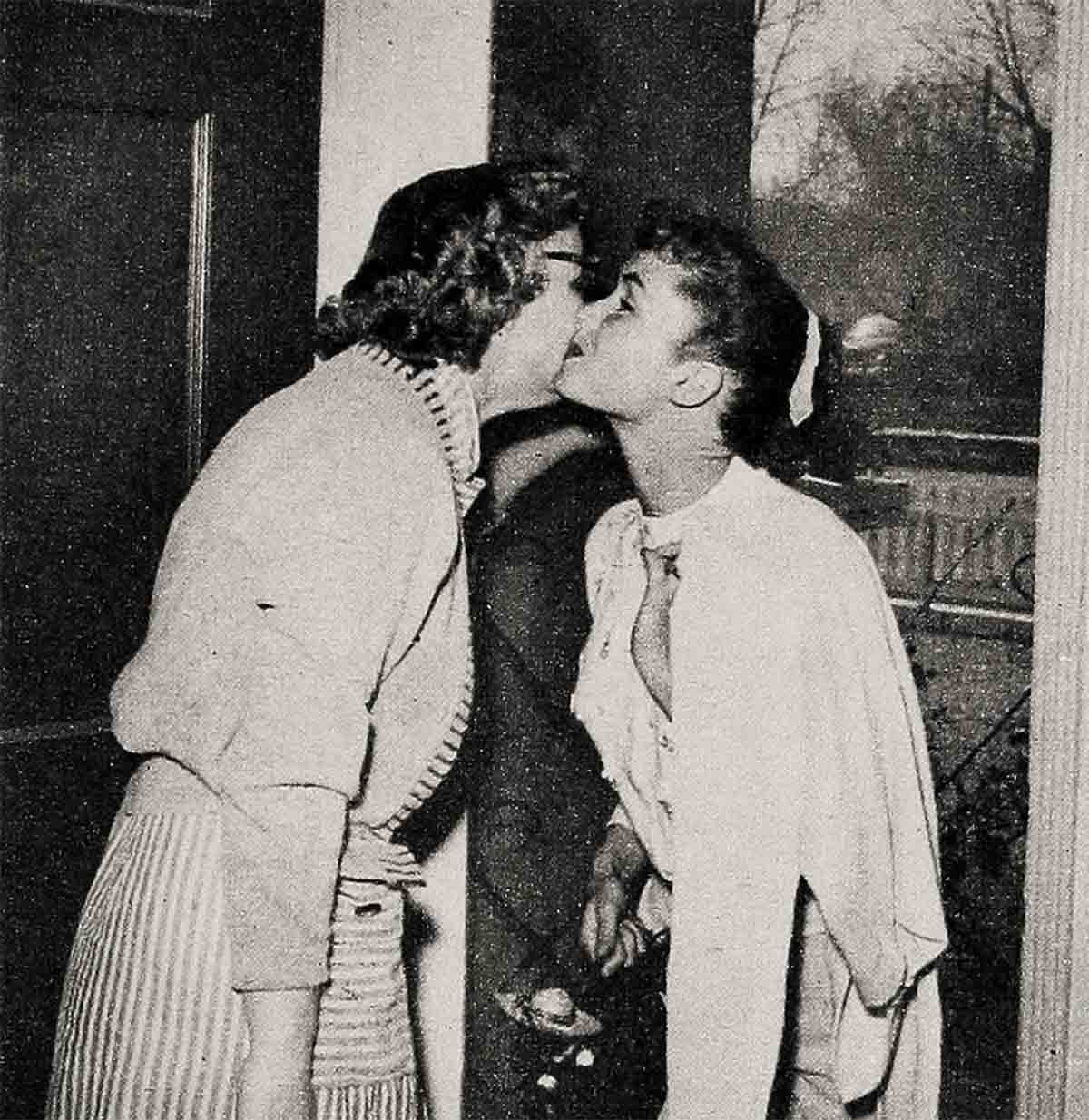
A girl from the outer edge of the circle inched forward. “Will it be a double-ring ceremony?”
Debbie winked. “Eddie says it will.”
“What’s your wedding gown like?” another voice whispered eagerly.
“Now, that,” Debbie said, “is going to be a surprise—even to Eddie.”
Just as she had promised, she stayed through a whole afternoon of gym classes. Repeatedly, she named her bridesmaids: Diane Cheek, Marian Weingarten and Jeanette Johnson, chums from her Girl Scout days.
Joyce Reynolds, her sister-in-law, would be her matron-of-honor. Little Peggy King, the cute vocalist on the George Gobel Show, Lori Nelson and Eddie’s youngest sister Eileen would be her bridesmaids.
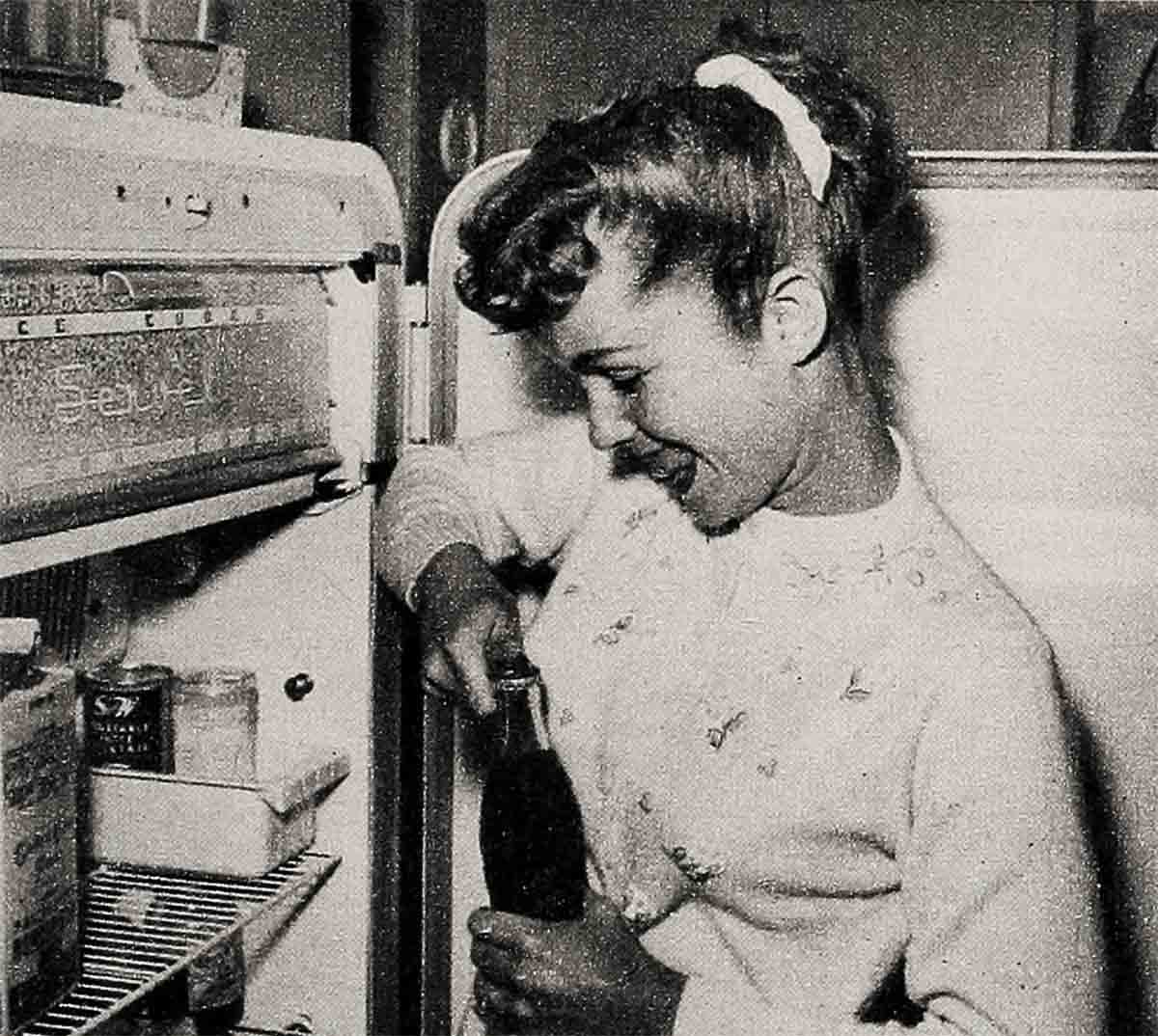
Her honeymoon would start early in July with a plane flight to New York.
“After a few days in New York,” she explained, “we’ll sail to Europe. We had reservations on the S.S. Americabut we had to cancel when our wedding date was moved back from June 17.
“Eddie has been to Europe four times, and Ive been to England just once by plane. Eddie says going by boat is the best honeymoon way, and I’m following his advice. When we get to Paris we’re going to pick up a little car and drive all over the continent. Eddie’s planning the itinerary and I don’t know it completely. But I do know we’ll tour Spain. I speak a little Spanish. We’ll also visit France, Italy, Switzerland, any countries that we have time for. We expect to be away three months, and I figure we can see plenty in two or three months. Any place that appeals to us—well, we’ll just stop and hang around until we get tired of it. Then we’ll move on.”
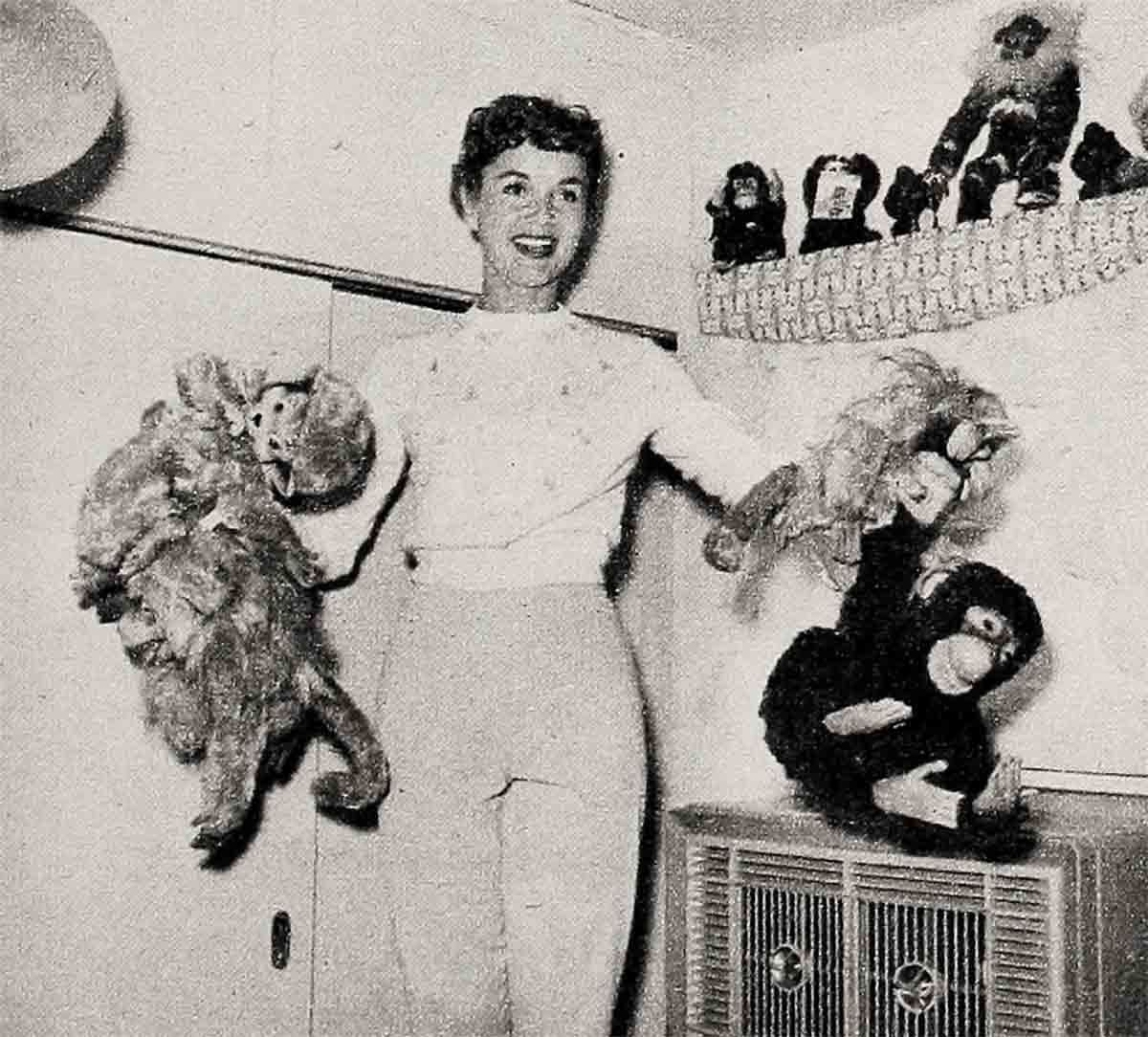
Come September, Debbie told the Glendale girls, she and Eddie will be back in California. She and Eddie hope to buy an English-style house with a pool somewhere in Beverly Hills or Hollywood When Eddie’s career takes him to New York they’ll probably live in a midtown hotel.
At the end of the school day Debbie invited Jeanette home for supper. Zipping along in Debbie’s new Ford Thunderbird—it’s fireman red—the two friends rode in comfortable silence for the first few miles. Then Jeanette said, “I hope you aren’t exhausted from talking.”
“Now, when,” Deb joked, “have you ever known me to get tired of talking?”
Jeanette smiled. All through school, she remembered, Debbie had been a regular magpie. Her report card had always suggested, “Mary Frances could improve her work if she talked less . . . She’s inclined to be too sociable in study periods . . .”
“Well, if you aren’t too exhausted,” Jeanette said, “how about filling me in on a few details. How come you changed the wedding date from June 17?”
Debbie looked at her pal for a fleeting moment. “Eddie and Mr. Blackstone. Mr. Blackstone’s his manager,” she explained. “They sat down one day and realized that Eddie couldn’t possibly finish his television shows much before the end of June, so we postponed the wedding. We’re both determined to get married and go on a honeymoon in the old-fashioned order of things. We didn’t want to have any work days between the wedding and our European trip.”
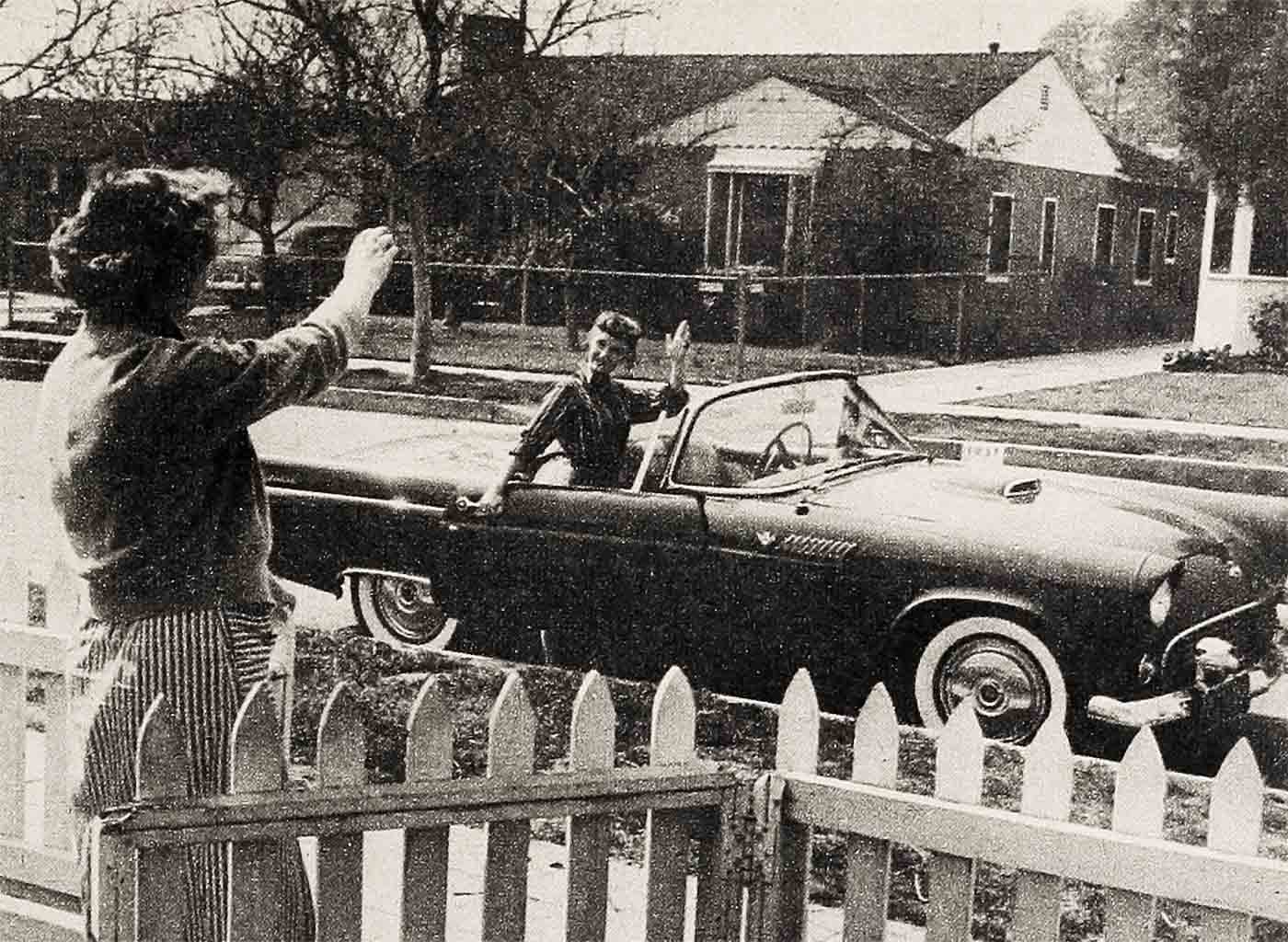
Originally, Deb ran on, she and Eddie had announced June 17 as the big day for sentimental reasons. It was the anniversary of their first date. A year ago on that day Eddie had telephoned from New York. Would she go to the Cocoanut Grove with him? Only after she accepted did she learn that it was opening night for Eddie’s engagement at the Grove.
“Of course,” Debbie admitted, “it might be easier if we gave up our romantic illusions and got married right away. But frankly we can’t see it that way. Because then our European trip would be a vacation and not the real honeymoon we want. Eddie and I are sticklers for certain traditions.”
Debbie Reynolds is a stickler for convention in other ways, too. In her own upbringing her father was the indisputable head of the Reynolds tribe. Debbie feels strongly that this is as it should be.
In her marriage to Eddie, Mr. Fisher will take on all the financial responsibilities. Any further income accruing to Debbie will go into investments. Moreover, the Fisher career will be the dominant factor in deciding where they live at any given time.
Debbie, in turn, will decide on furnishings and plan the meals, manage the household staff, and look after the children.
In the matter of bridal showers and parties, Deb told Jeanette that Lori Nelson and another friend, Milly Ericson, John Ericson’s wife, had asked for the first bridal shower to include the old Burbank gang. Terry Moore had also spoken for a free evening early in June so that she could invite the show business friends who had toured Army camps. Then Helen Rose, the MGM dress designer, had asked if she might give a party for studio people.
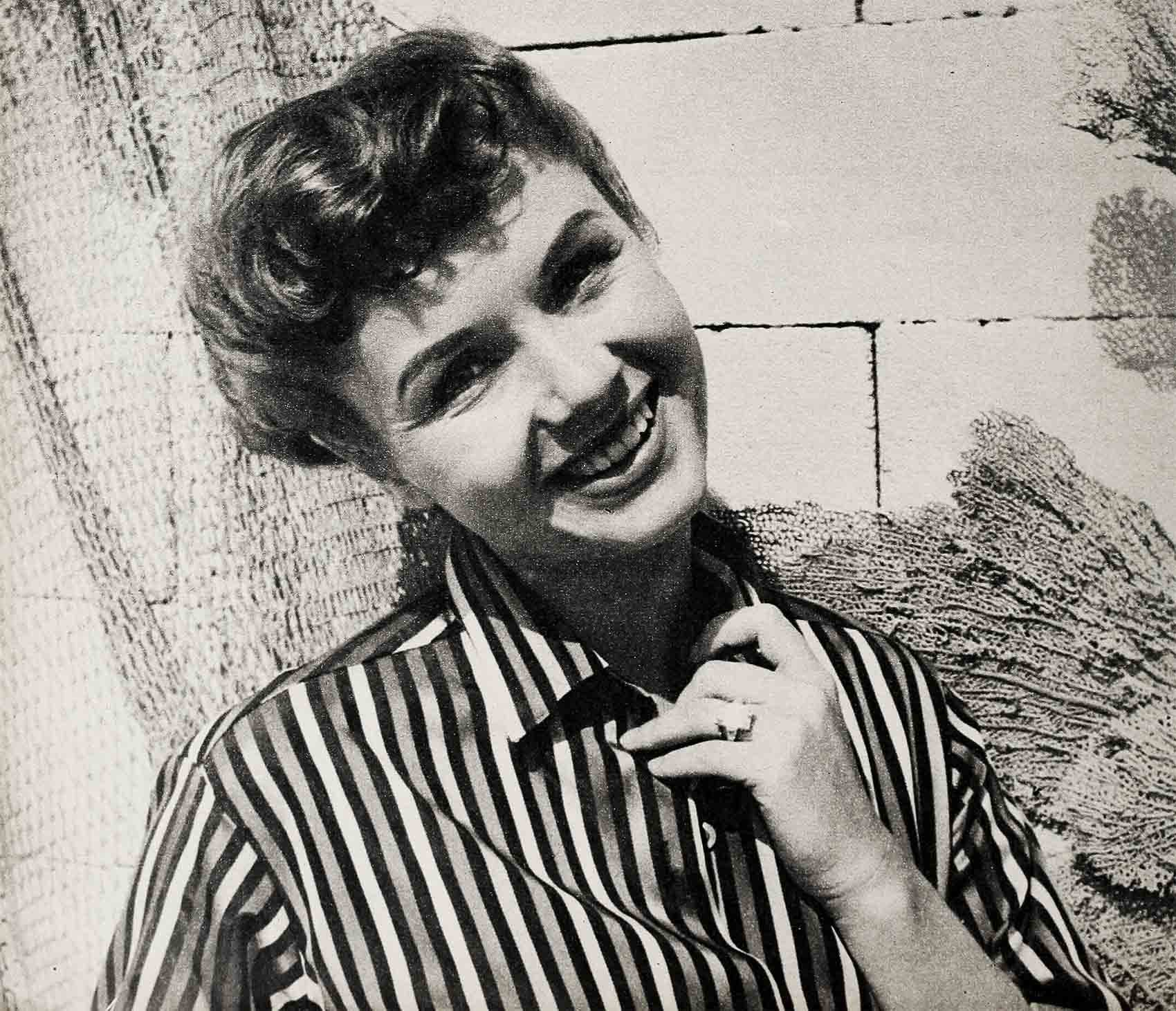
“All they asked me,” Debbie said, “was to name the kind of shower I needed. I had to laugh. Honestly, Jeanette. Because all I’ve got so far are six cut-work pillowcases, some doilies that my grandmother made for me and the Westmoreland flatware that I got posing for an ad. Right now I’d appreciate an egg beater and a few dish towels.”
Endowed with a touch of the practical, Jeanette said, “Where you going to keep the wedding presents and shower gifts?”
“Holy cow!” the future Mrs. Fisher exclaimed. “I never even thought of that. Oh, well, we’ll work something out.”
That sums up Debbie’s philosophy about setbacks, major and minor. She’s an incurable optimist. Everything will work out, that is, if you have faith in yourself.
There are some skeptics in Hollywood who predict that in the Reynolds-Fisher alliance, there will be a good deal of career competition. Debbie scoffs at this. “Things will work out for the best.”
Critics also point up the religious differences between Eddie and his bride-to-be. Here again Deb refuses to worry. “What problems?” she maintains. “We both believe in God. As for any other problems that should arrive, Eddie is such a basically solid fellow that any difference we have can easily be settled with love and patience.”
Debbie knows that Eddie’s career is infinitely more complicated than hers. He has three distinct bosses: the Coca-Cola Company, sponsors of his TV show; RCA, owners of his recording contract, and NBC, his television employer. Debbie is simply under contract to MGM, who have obligingly scheduled no pictures for her until after her honeymoon.
For Eddie’s sake the Coca-Cola people and NBC got together and agreed to let Eddie telecast from the west coast.
“For recording sessions, and business meetings about his records, however,” Debbie points out, “Eddie will be in New York part of the time. He wouldn’t think of working with any music conductor except Hugo Winterhalter. Eddie thinks he’s ‘the greatest. When he’s working on his recordings, I will naturally go with him. I’ll catch up on shows and concerts. Everything that is right will always work out.”
When Debbie and Jeanette arrived at the Reynolds house later, Deb had great fun explaining some of the preliminary preparations for her wedding. In the sun porch Mrs. Reynolds and four of Debbie’s friends had set up an operations center.
To date they’ve compiled a master card file of all the guests’ names and addresses. They will also keep a record of invitation acceptances, and when the gifts start descending on Evergreen Street they will neatly identify each gift on a little card. Presently, Debbie will take this stack of cards and write hundreds of thank-you notes.
“You’ve really got a set up here!” Jeanette Johnson agreed. “How many people do you expect at the wedding, anyway?”
“Just as I told the kids at school,” Debbie expounded, “we don’t want to leave anyone out. People’s feelings are so easily hurt. So we’ve made up—or I guess, will make up—a double list. One group will be invited to the wedding and the reception, and the other group to the reception.”
“Where can you get a place large enough?”
Debbie chuckled. “We’ve been wondering, and we haven’t decided yet. I guess it could be in a large hotel, like the wedding for Joan Benny. We do know it’s going to be held at night so that everyone who’s working in the day can make it. Now, this means that Eddie and his best man will wear summer tuxedos. Helen Rose will give me the full bridal treatment—a floor-length gown, cap, veil—the works.”
“And what about your bevy of beautiful bridesmaids?” Jeanette asked.
“Don’t worry a minute,” Debbie assured her friend. “You’re in good hands. Lawrence Evans and my mother are going to make your dresses as soon as Helen and I can come up with a suitable style. Lawrence is doing my trousseau, too.”
All her life Debbie Reynolds has had a clothes problem. Even when she was a small girl her mother was never able to buy anything that fit her daughter properly. As a result, she made most of Deb’s clothes. This arrangement continued until a few years ago when Debbie’s need for many clothes became too much for Mrs. Reynolds. She and Debbie set about finding a designer who had a definite talent for small-size figures. They found Lawrence Evans, a gifted couturier. He’s made most of Debbie’s outfits since then.
For her going-away trousseau he’s planning “clothes that will travel well.” Debbie and Eddie have agreed to take only one large suitcase each on their honeymoon. Debbie’s wardrobe, therefore, must be carefully thought out. She’s relying heavily on separates, clothes that will mix and match and offer variety in the change. She will take only sheath dresses because they take less room than full skirts and petticoats. The colors will be carefully coordinated so that two sets of accessories go with everything. Debbie plans to take one pair of black shoes and white summer sandals plus matching pocketbooks.
“When the honeymoon is over,” she says, “well have some sort of house to move into. But whether it will be our own or rented I can’t be sure. Eddie and I are so positive about the sort of house we want that I’m afraid we’re going to have to, build. We saw one house in Beverly that we both love but it wasn’t for sale or rent.”
When Debbie was a teen-ager she and her girl friends used to drive through Bel Air and Beverly Hills and look at the lovely big homes. The ones that always appealed to Mary Frances, as she was called in those days, were vine-covered English Tudor houses with massive oak doors.
This past winter when it became apparent that she would soon need a home of her own, Debbie took to driving up and down the streets of Beverly Hills again. One day she saw her dream house. She summoned her courage and walked to the front door, cold. She knocked and waited. No answer, so she jotted down the address.
Next time she tried the house, Eddie was with her. On this day the owners were home. Eddie explained their interest in the house, and the owners invited them in to look around.
“It had just what we need,” Debbie recalls. “A paneled living room, a small dining room, and two bedrooms. Only it wasn’t for sale.
“When we do get a home of our own, it will be English outside but modern inside. We want to use contemporary furnishings rather than English period, which is too heavy for our taste. Eddie and I like large couches and plain modern wooden cabinets. We want simple fabrics and big handsome lamps, and we’re going to bring back from Europe, if we have any luck, some paintings and art objects and maybe a grandfather’s clock—things that will reflect our taste and remind us of our honeymoon.”
The mailman’s whistle cut into Debbie’s speculations. She rushed to the door and handed the man an airmail envelope, addressed to Mr. Eddie Fisher, Essex House, New York City.
“This is one more reason why I’m living for the future,” she laughed, “so we can stop corresponding and live happily forever after.”
THE END
—BY MARVA PETERSON
It is a quote. MODERN SCREEN MAGAZINE JUNE 1955





No Comments